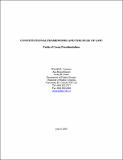| dc.contributor.author |
Maxwell A. Cameron, Ana-Maria Blanaru, Lesley M. Burns |
| dc.coverage.spatial |
Canadá |
| dc.date.accessioned |
2016-01-08T19:10:47Z |
| dc.date.available |
2016-01-08T19:10:47Z |
| dc.identifier.uri |
http://desa1.cejamericas.org:8080/handle/2015/4317 |
| dc.description.abstract |
Presidential systems are less likely to survive and are more prone to political instability than parliamentary systems. The differences between the two constitutional types are greatest where the rule of law is precarious, allowing crony presidentialism to prevail. Minority presidents may rely on cronyism to build coalitions, making them vulnerable to court challenges and creating an incentive to stack courts. Their alternative is often to face the threat of executive-legislative deadlock, becoming lame ducks targeted by the opposition for extra-constitutional efforts to remove them from office or compelled to rule, often at the margin of the law, by means of the abuse of decree authority. The lower democratic survival and stability rates found among presidential systems where the rule of law and judicial independence are weak indicate that intrinsic features of each constitutional system form part of the explanation for the differences in performance. Presidentialism and weak legal enforcement interact to produce greater political instability and regime fragility. |
| dc.language.iso |
English |
| dc.title |
Constitutional Frameworks and the Rule of Law: Perils of Crony Presidentialism |
| dc.ceja.source |
Fuente: University of British Colombia |

